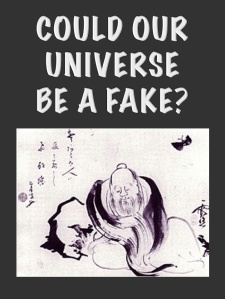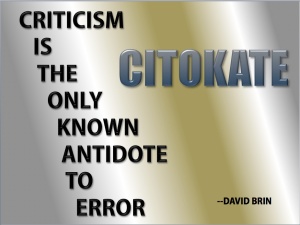== PRIVACY AND TRANSPARENCY==
For more detail, see a compilation of some articles and interviews about transparency, freedom and technology .
--Do you worry about the loss of privacy as both the government and amateurs have more and more access to surveillance?
 I got some of my nicest letters based on Chapter 9 of The Transparent Society, where I disassemble my own theory, appraise and talk about all sorts of ways that a transparent society could go wrong! For example, you could have a really nasty version of majority-rule, such as Ray Bradbury shows in Fahrenheit 451. Even if transparency prevents Big Brother, will that mean we’ve traded top-down tyranny for the lateral kind? Oppression by hundreds of millions of judgmental Little Brothers?
I got some of my nicest letters based on Chapter 9 of The Transparent Society, where I disassemble my own theory, appraise and talk about all sorts of ways that a transparent society could go wrong! For example, you could have a really nasty version of majority-rule, such as Ray Bradbury shows in Fahrenheit 451. Even if transparency prevents Big Brother, will that mean we’ve traded top-down tyranny for the lateral kind? Oppression by hundreds of millions of judgmental Little Brothers?
Serious concerns, Still, real life offers reason to hope. If you look at the last 50 years, whenever the public learns more about some eccentric group, it judges that group on one criterion: Is this group mean?
Are they harmful and oppressive to others? When the answer is yes, the more we learn about the group, the less they’re tolerated. If the answer is no, the more we learn about the group, the more they’re tolerated. Look back. More exposure and information about others reduced racism, sexism, homophobia... but increased our aversion to groups like the KKK or Stalinists. No other criterion explains this.
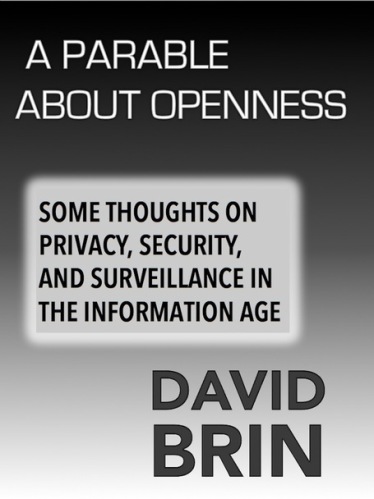 If that’s true and if it holds in the future—if people continue to defend others’ eccentricities because...
If that’s true and if it holds in the future—if people continue to defend others’ eccentricities because...a) they think it’s cool to live in a world of harmless eccentrics and...
b) for the sake of their own protection—then you would likely see a 51 percent or 60 percent or 70 percent dictatorship by a majority that insists on crushing just one thing… intolerance. Okay, that’s still group-think majority-imposed will. But the least harmful one you can imagine.
As far as privacy itself is concerned, I have a simple answer to that. (It makes up Chapter Four of The Transparent Society.) Human beings want it. We naturally are built to want some privacy. Moreover, if we remain a free and knowing people, then sovereign citizens will demand a little privacy, though we’ll find that we must redefine the term for changing times.
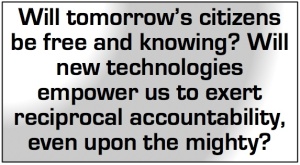 The question really boils down to: Will tomorrow’s citizens be free and knowing? Will new technologies empower us to exert reciprocal accountability, even upon the mighty? It may seem ironic, but for privacy and freedom to survive, we’ll need a civilization that is mostly open and transparent, so that each of us may catch the would-be voyeurs and Big Brothers. So that most of us know most of what’s going on, most of the time.
The question really boils down to: Will tomorrow’s citizens be free and knowing? Will new technologies empower us to exert reciprocal accountability, even upon the mighty? It may seem ironic, but for privacy and freedom to survive, we’ll need a civilization that is mostly open and transparent, so that each of us may catch the would-be voyeurs and Big Brothers. So that most of us know most of what’s going on, most of the time.
It can happen! The proof is us. Because it is already the method that we’ve used for 200 years. And to see this all laid out, have a look at one of the only public policy books from the 20th Century that’s still in print and selling more each year.
--What do you foresee as tiny cameras proliferate?
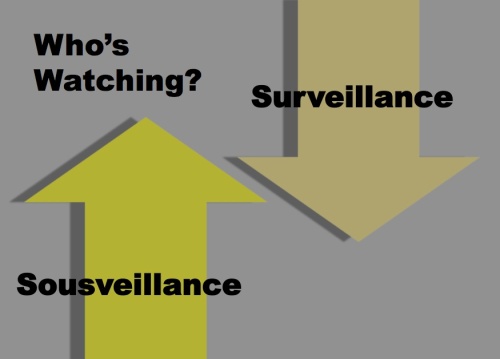 Essentially, this is the greatest of all human experiments. In theory… sousveillance (looking at the mighty from below) should cancel our worst fears about the surveillance state, if we get into the habit of stripping the mighty naked.
Essentially, this is the greatest of all human experiments. In theory… sousveillance (looking at the mighty from below) should cancel our worst fears about the surveillance state, if we get into the habit of stripping the mighty naked.
If that happens, we should eventually equilibrate into a situation where people - for their own sakes and because they believe in the Golden Rule, and because they will be caught if they violate it - eagerly and fiercely zoom in upon areas where others might be conniving or scheming or cheating or pursuing grossly-harmful deluded paths…
… while looking away when none of these dangers apply. A socially sanctioned discretion based on “none of my business” and leaving each other alone… because you’ll want that other person to be your ally next time, when you are the one saying “make that guy leave me alone!”
That is where it should wind up. If we’re capable of calm, or rationality and acting in our own self-interest. It is stylishly cynical for most people to guffaw, at this point, and assume this is a fairy tale. I can just hear some readers muttering “Humans aren’t like that!”
Well, maybe not. But I have seen plenty of evidence that we are now more like that than our ancestors ever imagined they could be. The goal may not be attainable. But we’ve already taken strides in that direction.
When it comes to privacy and accountability, people always demand the former for themselves and the latter for everyone else.
-How will greater openness affect our society?
We already live in the openness experiment, and have for two hundred years. It is called the Enlightenment -- with "light" both a core word and a key concept in our turn away from 6,000 years of feudalism. All of the great enlightenment arenas -- markets, science and democracy -- flourish in direct proportion to how much their players (consumers, scientists and voters) know, in order to make good decisions. To whatever extent these arenas get clogged by secrecy, they fail.
 But the next step in people empowerment is even more impressive -- those burgeoning "smart mobs" Howard Rheingold and Clay Shirky and Vernor Vinge talk about. (Also shown in my latest novel, Existence.) It's agile. It's wired.
But the next step in people empowerment is even more impressive -- those burgeoning "smart mobs" Howard Rheingold and Clay Shirky and Vernor Vinge talk about. (Also shown in my latest novel, Existence.) It's agile. It's wired. Every generation innovates, or the Enlightenment dies.
- In EARTH (1989) you forecast that a huge world issue in the 2010s and 2020s would be international banking secrecy. Now, daily revelations seem to be bearing that out. Do you still foresee something like a "Helvetian War"?
An actual, physical war, waged by nations of the developing world against the great banking havens? Well, not really. That was an exaggerated metaphor for a novel that achieved dramatic effects. But I do still expect increasing radicalization and pressure from many newly rising nations, when they realize that their former, kleptocratic lords stole literally trillions that might save and give hope to millions of children back home, if the money were recovered.
 This issue won't go away. Just recently (April 2013) a cache of 2.5 million files has cracked open, spilling the secrets of more than 120,000 offshore companies and trusts, exposing hidden dealings of politicians, con men and the mega-rich the world over. In my novel, Earth, I predicted this would be the core issue of our times. I still think things will play out that way.
This issue won't go away. Just recently (April 2013) a cache of 2.5 million files has cracked open, spilling the secrets of more than 120,000 offshore companies and trusts, exposing hidden dealings of politicians, con men and the mega-rich the world over. In my novel, Earth, I predicted this would be the core issue of our times. I still think things will play out that way.
Or return to Part 1: Questions on Writing and Science Fiction
David Brin

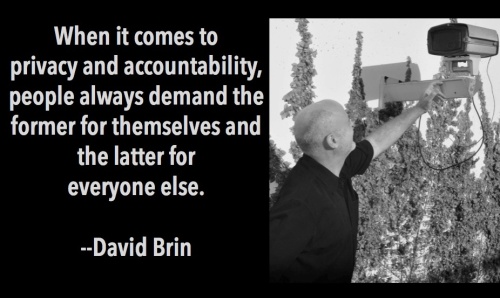
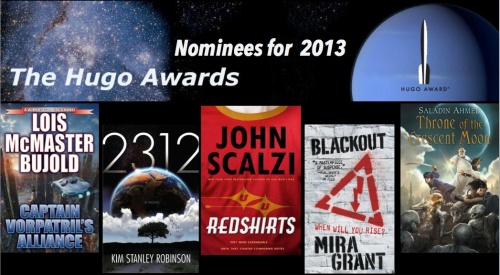
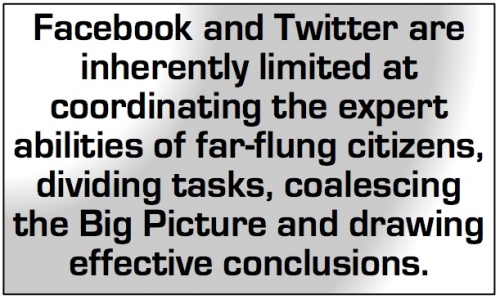







 Beyond This Horizon
Beyond This Horizon




